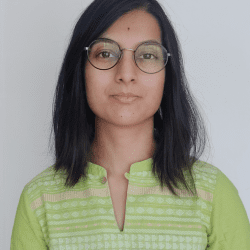Nidah Kaiser, PhD Candidate, SOAS, University of London (United Kingdom)
Project title: Needs Assessment in Anti-Muslim violence: A Study of, for, and by Indian Muslims
Nidah’s primary research question is: How is a communo-political legal system, and consequent institutional violence, experienced by, and transformative of, the lives of ordinary Muslims in Uttar Pradesh? It is a gathering of narratives which counter the erasure of knowledge and the trauma of injustice and violence to which minorities may be subjected. It is also the documentation of the process whereby this erasure has taken place.
The central objective of the workshop is to subvert the legal and media paradigm, by centering Muslim communities in research and histories, of their own identities and experiences. Thus, the voices of lower caste and class Muslims in Western UP will be drawn into focus, to understand the needs of, and gauge the impacts on, their lives, of the violent practices of the state and vigilante groups, in cases of alleged cow-slaughter and religious conversion. Nidah will spend at least three-four weeks, and make follow-up visits, in each of the seven locations to build networks, connections, and trust with the interviewees.
This project will have a dual approach to collaboration. First, there is a community partnership between the researcher and an NGO in planning and executing the research. The primary research question of this study (above) was formulated after discussion with, and inputs from, the NGO. The study will collaborate on the knowledge of the impact of violence, which will serve as a contribution to the NGO's work on assessing the needs of the communities and providing legal, social or medical aid as identified. The NGO's role will be as a facilitator and beneficiary in the study between the researcher and the community members. While existing literature will be used to guide the research, the NGO's experiential information will be given privilege in order to re-interpret the existing interdisciplinary literature in political science, sociology, and ethnography of law. The second community partnership is between the researcher and the participants in order to understand and document their oral testimonies. The role of the participants is to be leaders in the documentation and recording of their history and their truths, of which they have been deprived through media and legal narratives. Building on the understanding that each partner in this research will have different experiences and perspectives, the study will collect narratives to help co-produce a framework for impact assessment. The focus on co-creation of knowledge will allow the respondents to decide which themes and experiences they would choose to share.
This proposal envisions to influence policy frameworks and public imagination by centering the perspectives of a criminalized and dehumanized community by documenting how Muslims in Uttar Pradesh experience, and are impacted by, the implementation of majoritarian laws on the ground. Nidah aims to create a community impact by sharing the learnings of the study with the participants via a report in English with pamphlets in Hindu and Urdu, to the NGOs and other non-governmental and civic society organizations.
